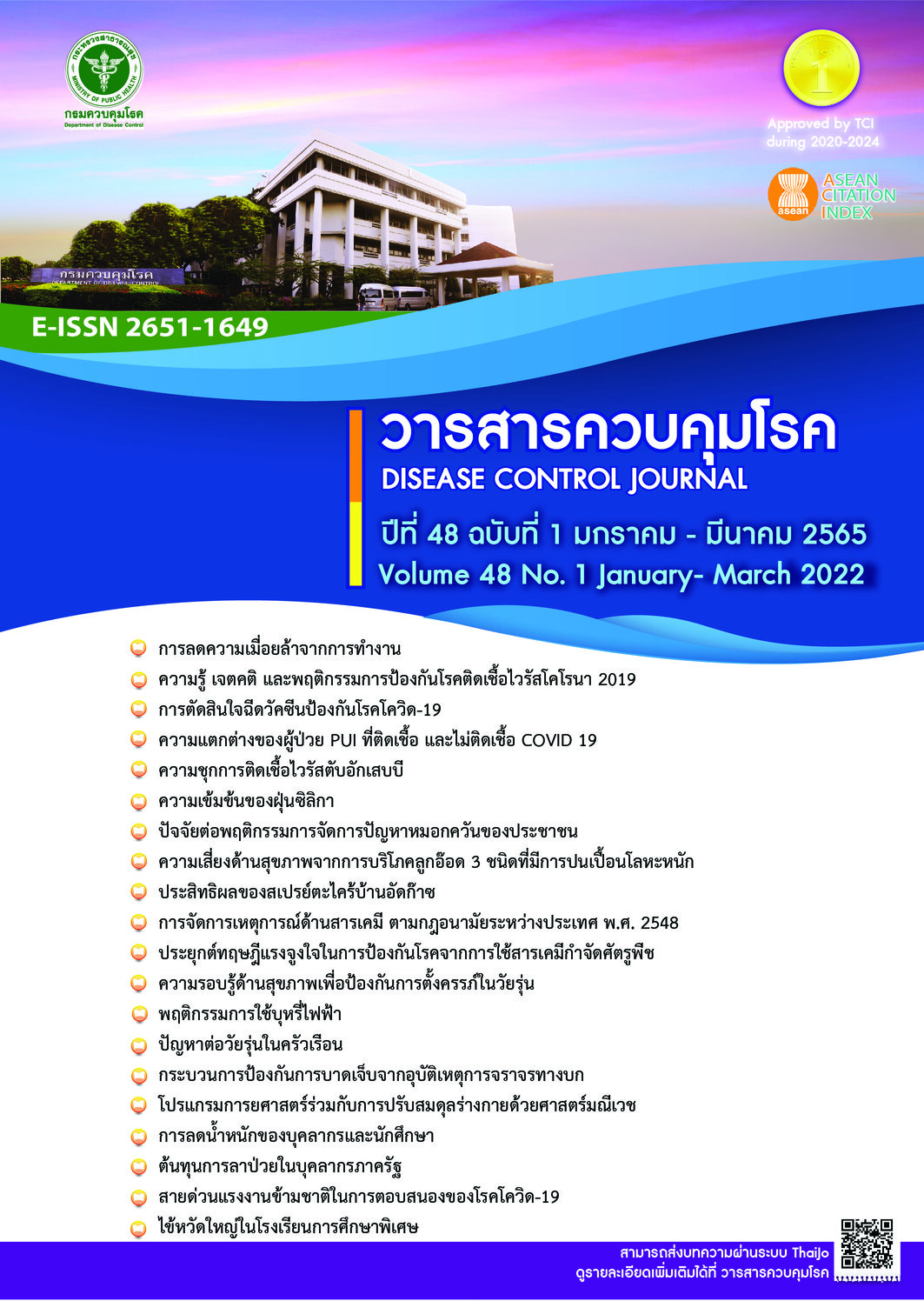The concentration of silica dust and health risk assessment among workers in a clay brick production factory, Ayutthaya province
DOI:
https://doi.org/10.14456/dcj.2022.6Keywords:
silica dust, exposure assessment, health risk assessment, clay brick production factoryAbstract
The objectives of this study aim to examine the silica dust contamination in working areas of clay brick production and to conduct a health risk assessment of workers in clay brick production factory in Phra Nakhon Si Ayutthaya province. The amount of particulate matter less than 10 micrometers was determined by using personal air sampling pump attached with the workers in 3 areas: raw material preparation area, baking area and post-baking area. The amount of particulate matter (PM) was examined; the total suspended particulate matter and the particulate matter less than 10 micrometer were analyzed by NIOSH methods 7601 with UV-Vis spectrophotometer. The health risk assessment from exposure to respirable dust were determined by risk assessment questionnaire of the U.S. Environmental protection agency. Samples were recruited from the clay brick factory workers in Phra Nakhon Si Ayutthaya province working in preparation area, baking area, or post-baking area. The results revealed that the silica dust concentration in summer was higher than those in rainy season, with the average concentration 0.214 milligram per cubic meter and 0.010 milligram per cubic meter respectively. Regarding health risk assessment, the workers who had worked in the preparation area, both in summer and rainy season, had the highest risk for silica dust exposure compared to the other areas (HQ = 1.91, 0.09) and it will lead to harmful effect mostly on lungs.
Downloads
References
Chiarakron S, Khummonkol P, Saphrom Y. The adsorption of volatile organic compounds by materials MCM-41 Synthesized from rice husk ash (Phase 1-2) [Internet]. [cited 2020 Jun 11]. Available from: https://www.kmutt.ac.th/rippc/ mcm41.htm (in Thai)
Division of Occupational and Environmental Diseases. Silicosis Diseases [Internet]. [cited 2020 Jun 11]. Available from: http://203.157.41.175/uploads/ situation/4_7_situation.pdf (in Thai)
Department of Health and Department of Disease Control. Guidelines for surveillance in areas at risk of air pollution [Internet]. [cited 2017 Jun 21]. Available from: http://www.oic.go.th/FILEWEB/CABINFOCENTER17/DRAWER002/GENERAL/DATA0000/00000200.PDF (in Thai)
National Labour Information Center. The problem of informal workers [Internet]. [cited 2017 Jun 21]. Available from: http://analytic.nlic.mol.go.th/analytics/ saw.dll?Dashboard (in Thai)
Pollution Control Department. Report on the situation and air quality in Thailand [Internet]. [cited 2021 Jun 21]. Available from: http://analytic.nlic.mol.go.th/analytics/ saw.dll?Dashboard (in Thai)
Yukongdi P. Ayuttaya ceramic production during the 15th to 18th centuries. Damrong Journal. 2010;19(1):153-70.
Jitlada C. Preparation of pure silica from rice husk and using as a silica source for synthesis of zeolite. Bangkok: Suan Sunandha Rajabhat University; 2011. 29 p. (in Thai)
Netirojjanakul W, Lukkanalikitkul E, Jiamjarasrangsi W. Silicosis in rubber industry: case report. Journal of Preventive Medicine Association of Thailand. 2017;7:312-20. (in Thai)
Meteorological Department. Climate [Internet]. [cited 2020 Jun 11]. Available from: https://www.tmd.go.th/
U.S. Environmental Protection Agency. Risk assessment guidance for superfund, volume 1 human health evaluation manual, part A. Office of emergency and remedial response U.S. Environmental Protection Agency Washington, DC. (1989).
Kwanma P, Pukngam S, Arunpraparu W. Meteorological factors affecting concentration of PM10 at Na-Phra Lan Sub-District, Chaloem Phra Kiat District, Sara Buri Province. PSRU Journal of science and technology. 2019;4(2):85-94. (in Thai)
Mankan W. The Causing Factors of the Smog Phenomenon in Lampang Basin. Burapha Science Journal. 2017;22(1):226-39. (in Thai)
Danpaiboon A, Liewsaree W, Chaisuwan C, Khantipongse J, Khacha-Ananda S, Nambunmee K. Epidemiology study of the association between silica and blood Heme Oxygenase-1 levels with silicosis. Disease control Journal. 2015;41(1):14-22. (in Thai)
Jitjamnong A. Industrial carcinogens. EAU Heritage Journal science and technology; 2015;10(2):6-16. (in Thai)
Department of Health. Guidelines for medical and public health activities to reduce and prevent health impacts from small dust particles in 2020 [Internet]. [cited 2021 Jun 21]. Available from: http://49.231.15.21/crhfileload/upload/files/TEAF2562121615042245. pdf
Downloads
Published
How to Cite
Issue
Section
License
Copyright (c) 2022 Disease Control Journal

This work is licensed under a Creative Commons Attribution-NonCommercial-NoDerivatives 4.0 International License.
Articles published in the Disease Control Journal are considered as academic work, research or analysis of the personal opinion of the authors, not the opinion of the Thailand Department of Disease Control or editorial team. The authors must be responsible for their articles.






